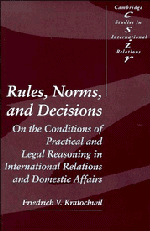 Rules, Norms, and Decisions
Rules, Norms, and Decisions Published online by Cambridge University Press: 01 June 2011
THE DOMESTIC ANALOGY, REGIMES, AND SOCIAL ORDER
The place of norms in political life has always been controversial, particularly in international relations analysis. The common-sense assumption that “law” begets order and that consequently disorder has to result from either the absence of a normative structure or the ineffectiveness of enforcement seems to have exercised such a powerful hold that people conceived of international politics largely in terms of a negative analogy to domestic politics. The conceptual blinders are so well established that traditionally persons interested in the study of international relations had to group themselves into two virtually exclusive “fraternities.” Those who denied that norms are important for international interactions called themselves – with typical modesty – “realists,” and those who were interested in norms were labeled “idealists.” The advocacy of law among the latter group could then be based on either hopes for a world government, the establishment of peace through law, or on the often somewhat embarrassed admission that international law, although useful for certain purposes, was not really “law.” In any case, the underlying dichotomy between domestic (law-governed) and international affairs (anarchy) appeared to be reinforced. World government advocates therefore shared with the realists a common Hobbesian framework. The latter, however, did not account for two major issues: first, the problem of how norms and institutions in general influence decisions and thus create social order, and second, whether and how order is possible in the anarchical realm of international relations.
To save this book to your Kindle, first ensure [email protected] is added to your Approved Personal Document E-mail List under your Personal Document Settings on the Manage Your Content and Devices page of your Amazon account. Then enter the ‘name’ part of your Kindle email address below. Find out more about saving to your Kindle.
Note you can select to save to either the @free.kindle.com or @kindle.com variations. ‘@free.kindle.com’ emails are free but can only be saved to your device when it is connected to wi-fi. ‘@kindle.com’ emails can be delivered even when you are not connected to wi-fi, but note that service fees apply.
Find out more about the Kindle Personal Document Service.
To save content items to your account, please confirm that you agree to abide by our usage policies. If this is the first time you use this feature, you will be asked to authorise Cambridge Core to connect with your account. Find out more about saving content to Dropbox.
To save content items to your account, please confirm that you agree to abide by our usage policies. If this is the first time you use this feature, you will be asked to authorise Cambridge Core to connect with your account. Find out more about saving content to Google Drive.